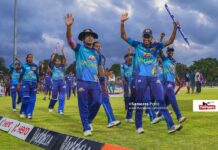After nearly 19 years of brutal war, peace reigned and things were looking up for Sri Lanka. The war that had kept Australia and West Indies from making the trip to Sri Lanka for the 1996 World Cup was seemingly over and now 12 cricketing nations would come together for the 2nd edition of the ICC Champions Trophy (the 1st edition was known as the ICC Knockout Trophy) in the paradise isle. With crowds thronging the Premadasa, the Lankan Lions gave the cricket lovers a tournament to savour as they finished as joint champions alongside India.
Sri Lanka vs Pakistan – Sri Lanka won by 8 wickets (with 83 balls remaining)
Grouped alongside the Netherlands, it was a make or break game for both Sri Lanka and Pakistan, with the winner likely to top the group and subsequently progress through to the semi-final stage of the tournament.
After choosing to bat on a slow Premadasa track, the Pakistanis, led by Wasim Akram, were in trouble very early on as they lost Shahid Afridi, Shoaib Malik and Yousuf Youhana within the 1st six overs. Soon to be retired Younis Khan and Misbah-ul-Haq played a familiar role in the middle order to resurrect the Pakistani innings alongside top scorer Saeed Anwar who made 52 as the visitors were bowled out for 200 in 49.4 overs.
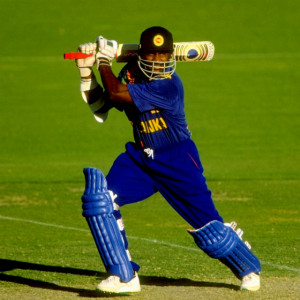
For Sri Lanka it was quite surprisingly the pacies who did most of the damage with Chaminda Vaas, Pulasthi Gunaratne and Dilhara Fernando picking up 6 wickets between them while Murali spun his web around the middle order to scalp Younis, Misbah and Akram.
With 30,000 local fans cramped into the Premadasa, Man of the Match Sanath Jayasuriya got his tournament off to the perfect start, smashing a composed century as Sri Lanka reached the target with nearly 14 overs to spare. Although 2 wickets in consecutive overs early on in the innings threatened to derail Sri Lanka’s chase, Jayasuriya, alongside stalwart Aravinda De Silva put on a epic unbroken 3rd wicket stand of 156 to all but secure Sri Lanka’s place in the semi-finals.
Sri Lanka vs Netherlands – Sri Lanka won by 206 runs
After a commanding performance against sub continental counterparts Pakistan, a win in the game against the Netherlands, an up and coming Associate nation, was almost a forgone conclusion.
It had been 6 years since the Netherlands had played at the top level and the difference between the two teams was clear to see as the men in orange were never in a position to put the hosts under pressure. Batting 1st after winning the toss, Sri Lanka’s openers Jayasuriya and Marvan Atapattu got the team off to a blistering start as the home team made 292/6. The highlight of the innings was Atapattu’s 101, his 6th ODI hundred. He was involved in a 116 run stand with Kumar Sangakkara, who made a scratchy 41.
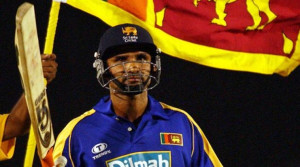
The Dutch were never quite in the game at any point and ultimately folded for 86, handing Sri Lanka a massive win. Tim de Leede made a fighting 31 but Sri Lanka’s 5 frontline bowlers were all captain Jayasuriya needed to bundle the visitors out. Muttiah Muralitharan, as expected, was nearly unplayable and ended up claiming 4/15 in 5.3 overs.
Semi Final – Sri Lanka vs Australia – Sri Lanka won by 7 wickets (with 60 balls remaining)
Despite it being a star-studded Australian line-up, with home advantage being in Sri Lanka’s favour, the hosts were definitely the favourites to go through to the big final, where they were to meet ‘big brother’ India, who had already qualified, courtesy a nervy win against South Africa.
Australia, led by Ricky Ponting, chose to bat after winning the toss and openers Mathew Hayden and Adam Gilchrist blasted their way to 49 in 7 overs. However, Aravinda De Silva made the breakthrough and Sri Lanka proceeded to claim 4 wickets for just 8 runs in 5 overs to stall Australia’s charge. The visitors never recovered and ended up making just 162 in 48.4 overs, their lowest total against the Lankans in ODIs, with Shane Warne (36) top scoring.
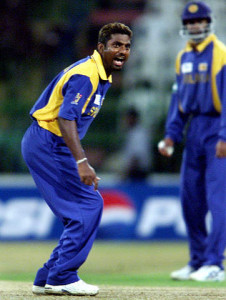
Sri Lanka’s main strategy was undoubtedly spin and it paid rich dividends as Murali continued his good form to claim 3/26 while Kumar Dharmasena, Aravinda De Silva and Sanath Jayasuriya chipped in with 4 wickets between them.
The Australians were sloppy in the field and although Sri Lanka were measured in their approach, they managed to claim the win with 10 overs and 7 wickets in hand. The top three, Jayasuriya, Atapattu and Sangakkara, sealed the deal for Sri Lanka making 42, 51 and 48 respectively.
Final – Sri Lanka vs India – No Result
The rains had held off thus far in the tournament but come the biggest of stages, the weather seemed determined to make an impact, ensuring that the Champion’s Trophy was shared between the two best teams of the tournament.
The final was pushed to its reserve day, with Sri Lanka winning the toss on both occasions and choosing to bat 1st.
In the 1st game, Sri Lanka started off well, with Jayasuriya in a customarily aggressive mood. He top-scored with 74 but the introduction of spin slowed things down considerably. Sangakkara made 54 and with India racking up 22 extras, the hosts managed to eke out 244.
Virender Sehwag slammed Pulasthi Gunaratne for 14 off his first over but an hour of heavy rain followed and play was called off subsequently. Despite the blistering start, the game was sure to go down to the wire with Sri Lanka’s spinners expected to come to the party later on in the game.
Day 2
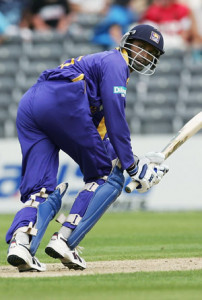
The pitch had gotten even slower and this time Jayasuriya was dismissed for a golden duck, giving India a promising start. Sri Lanka were in trouble on 71/4 at one stage but a 108 run partnership between Mahela Jayawardene and Russel Arnold, neither of whom had had much of a bat during the tournament, helped Sri Lanka to a par score of 222.
India’s innings lasted longer this time, with the weather allowing nearly 9 overs of play to be possible before the rains once again intervened. Sehwag smashed 3 boundaries and one six on his way to 25 off 22 but both Dinesh Mongia and Sachin Tendulkar struggled to time the ball, which went on to show that 222 may even have been a winning total.
With no result possible after two frustrating days, the trophy was shared between the two Asia giants and Sri Lanka had its first taste of global success since that magical night in 1996.




